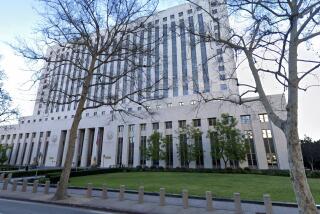Judge Holds ‘Dump Ed Campaign’ to Contribution Limits
In a campaign-law ruling that could have greater impact after the Nov. 7 election than before, a Superior Court judge Wednesday decided that the city’s $250-per-person contribution limit applies to an independent committee that hopes to defeat San Diego City Councilman Ed Struiksma.
Siding with Dist. Atty. Edwin Miller’s interpretation of the city’s campaign law, Judge William Mudd ruled that the Dump Ed Campaign ’89 could not legally accept a $2,500 contribution from John Cheney, a Linda Vista landlord who earlier gave $4,800 to the same group.
Though Cheney’s attorney argued that his contributions are a form of free speech protected by the First Amendment and not subject to the city’s $250 limit, Mudd ruled that Cheney brought himself within the scope of the law by donating the money to the anti-Struiksma committee rather than spending it himself.
Concurring with prosecutors, Mudd also questioned whether the Dump Ed Campaign adhered to the spirit, if not the letter, of laws governing so-called independent campaign committees. As defined by election laws, an independent committee is one that spends money or takes other actions without consultation or advice from the candidate or cause it intends to benefit.
“This is not a committee called Citizens for a Pretty San Diego--it’s called . . . the Dump Ed Campaign,” Mudd said. “While this is referred to as an independent expenditure committee, it’s oriented and directed at a specific candidate. Only one candidate is going to benefit from it, and only one is going to suffer from it. I can’t overlook that.”
Arguing that applying the $250 limit to independent campaign committees is “grossly unconstitutional,” attorney Dan Stanford, who represented Cheney and the group, said after the hearing that he intends to pursue the case after the election to clarify the “politically and constitutionally significant” issues involved.
“We’ve got to pursue this case because of its devastating effect on the political process, not only this year, but for future years,” Stanford said.
Wednesday’s ruling, though having potential long-range significance, may have only a limited impact on Struiskma’s bid for a third, four-year term against former City Hall staffer and land-use consultant Linda Bernhardt.
The Dump Ed Campaign plans to continue spending money within the confines of the local election law, and Stanford suggested that Cheney may still spend as much as he originally planned, though in a different manner. Rather than donating to the committee, Cheney may simply confer with some of its principals “in their living room” on how best to use his money in the race and then directly pay for mailers, postage or other expenses himself, rather than using the campaign group as a middleman.
“For my clients, it will be business as usual, with one slight exception,” Stanford said.
In a letter sent last week to one of the officers of the Dump Ed Campaign, Miller said the group would not be prosecuted for accepting the previous donations above $250. However, the district attorney also put the group on notice that it might face prosecution if it continued to accept contributions in excess of the limit--an interpretation that will force the group to return Cheney’s $2,500 check.
Because Stanford was seeking a temporary restraining order Wednesday that would have permitted the Dump Ed Campaign to accept donations above $250, Mudd’s decision stemmed less from the merits of the lawsuit than it did from the narrow legal question or whether the plaintiffs’ rights would have been irreparably jeopardized by an adverse ruling. Though Mudd ruled that that was not the case, his decision did not settle the overriding question of how or if the activities of independent committees may be limited.
The case, closely watched within San Diego political circles, could have a dramatic effect on the structure and financing of local campaigns, should Miller’s position be overturned. Political consultants have said they expect independent committees would multiply quickly if given clearance to solicit unrestricted donations. The committees are used on a limited basis, primarily in ballot measure campaigns.
The importance of the case is underlined by the unlikely political alliance formed to combat Miller’s interpretation of the city’s 16-year-old campaign law. Stanford, former chairman of the state Fair Political Practices Commission, is a Republican and Struiksma supporter, but Cheney vigorously opposes the 5th District councilman. In addition, Mark Zerbe, the treasurer of the Dump Ed Campaign, is a Democrat and former head of the San Diego chapter of Common Cause.
Acknowledging that he and Zerbe have “diametrically opposed political views,” Stanford stressed that the two nevertheless agree that independent committees should be unfettered by the city’s $250 ceiling on individuals’ campaign donations. Noting that courts consistently have upheld individuals’ rights to independently spend unlimited amounts of their own money in campaigns, Stanford contended that imposing the $250 limit on the Dump Ed Campaign would have a “serious chilling effect” on First Amendment rights.
“My clients are individuals who have banded together to participate independently in the ongoing City Council race,” Stanford said. “They’re involved in the race not at the behest of, the request of or in coordination with any candidate. They’re acting independently.”
But Deputy Dist. Atty. Rodger Overholser argued that it “stretches credulity a little” to characterize donations to the Dump Ed Campaign as truly independent expenditures, given that the group’s purpose is to defeat “one candidate who has only one opponent.”
“That is tantamount to, in effect, giving it to the opponent of Mr. Struiksma,” Overholser said. “By giving your money, you are in effect allowing someone else to speak for you. . . . You can’t have free speech by proxy.”
Similarly, Chief Deputy City Atty. Ted Bromfield, the city’s election-law specialist, added: “When you band together in a committee, you subject yourself to restrictions.”
More to Read
Sign up for Essential California
The most important California stories and recommendations in your inbox every morning.
You may occasionally receive promotional content from the Los Angeles Times.






